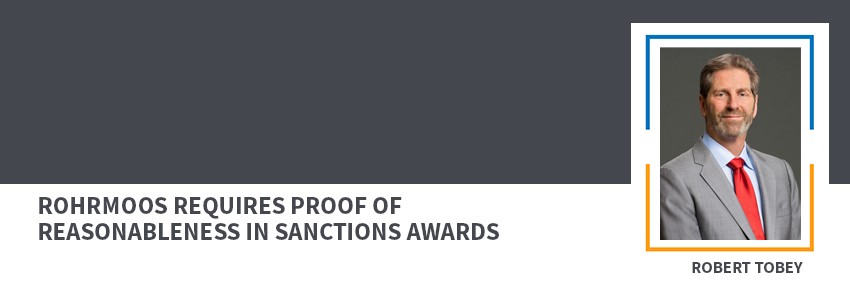
In my last blog, I discussed the Texas Supreme Court’s decision in Rohrmoos Venture, et. al. v. UTSW DVA Healthcare, LLP clarifying the proper method for proving up attorney’s fees under the lodestar method using the eight factors from Arthur Andersen v. Perry Equipment Corporation, 945 S.W. 2d 812 (Tex. 1997) to calculate the base lodestar.
On June 21, 2019, the Court decided Nath v. Texas Children’s Hospital, et. al., holding that the Rohrmoos analysis applies to sanctions awards. Nath sued Texas Children’s Hospital and Baylor Hospital for defamation. After the case was litigated for nearly five years, the hospitals filed summary-judgment motions. The trial court dismissed Nath’s claims, held that his claims were frivolous, and assessed $1.4 million in attorney’s fees as sanctions.
This actually was the Supreme Court’s second decision in the case. In its first decision, the Court affirmed the trial court’s finding that Nath’s pleadings were groundless and sanctionable, but reversed the sanctions award and remanded the case instructing that a party “cannot arbitrarily shift the entirety of its costs on its adversary simply because it ultimately prevails on a motion for sanctions.”
On remand, the Hospitals tendered affidavits from the attorneys asserting they did nothing to prolong the suit or unnecessarily increase the fees. The affidavits stated the total amounts billed to their clients to defend the suit. The trial court agreed and reassessed the $1.4 million in compensatory sanctions.
In the second appeal, Nath contended that the affidavits were insufficient to prove the fees were reasonable and necessary. The hospitals argued that a different evidentiary standard should apply because sanctions are designed to punish violators and deter misconduct. The Supreme Court rejected the hospitals’ position because otherwise, a court would not be able to determine that the sanction is no more severe than necessary to fairly compensate the prevailing party. The Court also found that the affidavits submitted by counsel for the hospitals were conclusory and did not substantiate either the reasonable hours worked or the reasonable hourly rate as required by Rohrmoos. The Supreme Court concluded that Rohrmoos applies in the sanctions arena, and remanded the case to the trial court to consider the sanctions award in light of its holding in Rohrmoos.
The practice pointers for attempting to shift fees are as follows:
- Keep contemporaneous billing records in all cases, including hybrid and contingent fee arrangements.
- Avoid block billing—even though it can sometimes result in lower billing to the client. Block billing is much easier to attack in a fee hearing.
- See if you can stipulate to a fee award with the other side. The Supreme Court in its opinion encouraged litigants to attempt to reach an agreement so that fights over fee awards do not become satellite lawsuits. If you can’t get agreement on a reasonable fee, see if you can stipulate to some issues to simplify the hearing.
- Enter your fee agreement and billing records into evidence at trial. If the case is appealed, you at least have facial proof of what is required.
- Be prepared to discuss all eight Arthur Andersen factors in your hearing. If some of the factors are not relevant, state why that is the case.
- Don’t forget to introduce evidence to explain why all expenses incurred were reasonable and necessary.
- Consider using an outside expert to support a fee award in larger cases. Using someone who at least to some degree is disinterested can bolster the legitimacy of the fee request.
Good luck with all future fee hearings!
